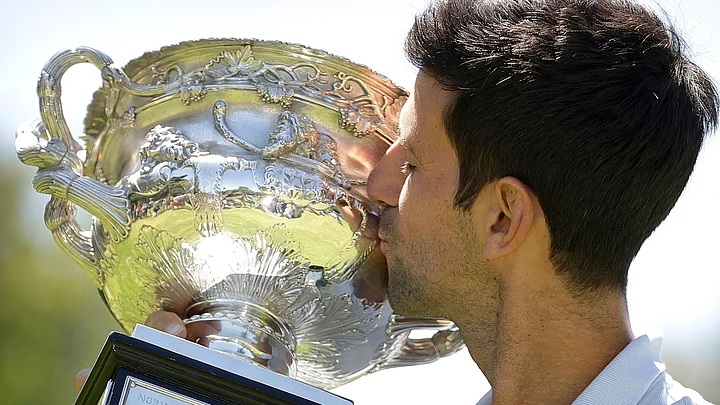Novak Djokovic sounds like a man ready to embrace the chase.
Already at 15 Grand Slam titles, Djokovic is now only two majors behind Rafael Nadal's total of 17, and five shy of Roger Federer's men's record of 20.
So a day after winning the Australian Open for his third Slam trophy in a row, Djokovic was asked about whether he is pursuing them.
It's the sort of thing some athletes – including Nadal, repeatedly, over the years – downplay or try to deflect entirely. Not Djokovic. He's owning this.
“Well, if I’m still playing and winning Slams, I think it’s logical to conclude that I am. I’m blessed to be able to win 15. I know there are two guys ahead of me now, in the history of the most Slams won, but I still have time. I’m not rushing.”Novak Djokovic
That's his team's theme.
Late Sunday night at Melbourne Park, Djokovic's coach, Marian Vajda, couldn't stop smiling as he dissected the unbelievably lopsided 6-3, 6-2, 6-3 victory over Nadal in the final — and its larger significance.
Yes, Vajda said, a record seventh championship in Australia means a lot. But he was interested in discussing a different tally.
“More important is the other number that he’s getting up to, 15. It’s an incredible, incredible number. I don’t want to go too far, but he’s in a very good position now for going for a little bit more.”Marian Vajda, Novak Djokovic’s Coach
“But 20 is still far away. A lot of things can happen. At the moment, Novak feels really good about reaching, maybe, another Grand Slam victory.”
Just one more?
“Yes, one more,” Vajda said with a hearty laugh, his voice rising as he fiddled with his tournament accreditation pass. “And then one more. And then one more. And then one more! One by one. Absolutely, his long-term goal is to reach Rafa's number and, if it's possible – and his age allows it – Roger's. Why not?”
A year removed from surgery to his right elbow, Djokovic is pain-free, ranked No. 1 and, perhaps, better than ever.
The near-perfection with which he won his last two matches – a combined 58 winners and 14 unforced errors in his semi-final and final – was something Djokovic termed "pleasantly surprising" and Nadal considered "the highest level possible."
Against Nadal, who hadn't dropped a set in the tournament or a service game since the first round, Djokovic managed five breaks. He also won 25 of the first 26 points he served.
“During the whole match, Novak was very disciplined,” was Vajda's assessment. “He had so many ups. He didn't have any downs.”
And so it is that everything seems in play at the moment for Djokovic.
Four major titles in a row, something he already accomplished from 2015-16: Why not?
A calendar-year Grand Slam, something no man has done since Rod Laver in 1969: Why not?
Catching up to, and eventually surpassing, Nadal and Federer: Why not?
When Djokovic's childhood idol, Pete Sampras, won the 2002 US Open by beating his greatest rival, Andre Agassi, in the final, it raised his Grand Slam count to 14. At that point, no other man in the sport's history had more than 12.
Federer, Nadal and Djokovic had a combined zero major championships back then. Look where that trio stands now.
Sampras had just turned 31 and would never play another match on tour.
Federer is 37, Nadal is 32, and Djokovic is 31. This is a different time.
As Vajda put it: “Roger is an example for all of us.”
So, yes, maybe Federer will add to his total. Nadal seems certain to, especially on the French Open's red clay.
It'll be fascinating to see where Djokovic winds up.
“I do want to definitely focus myself on continuing to improve my game and maintaining the overall well-being that I have – mental, physical, emotional – so I would be able to compete at such a high level for the years to come,” Djokovic said, “and have a shot at eventually getting closer to Roger's record.”
(At The Quint, we question everything. Play an active role in shaping our journalism by becoming a member today.)
